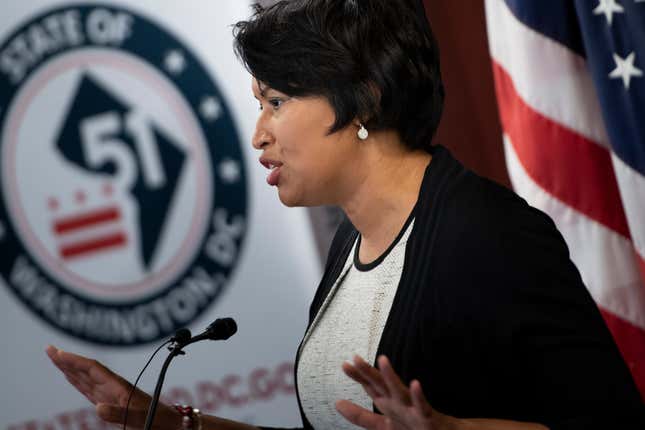
To find some of the worst recorded coronavirus disparities between Black and white residents, you need look no further than the nation’s capital, where Black residents have died of COVID-19 at a rate nearly six times that of white people in the city. As has been made explicit by numerous public health experts, reporters, and racial justice advocates, the cause of these divisions are largely systemic. But public officials failing to respond with urgency and care to the crisis has also played its part. According to a new report from American Public Media (h/t NPR), “missteps” in Mayor Muriel Bowser’s handling of the crisis helped contribute to the gulf between how the virus has impacted Black residents versus white ones.
Black D.C. residents comprise nearly 50 percent of the city’s population, but have accounted for nearly 2 out of every 3 deaths. This statistic is directly tied to a stark, decades-long divide in how Black Washingtonians live versus white their peers. But as APM reports, there were “crucial missteps” from the Bowser administration with regard to delays, lack of testing, and poorly resourced hospitals that have had a disproportionate impact on Black people.
Lack of Early Testing
The city did not open any sites for free coronavirus testing east of the Anacostia River until early April. This portion of the city—made up of a large swath of Southeast D.C. and a portion of Northeast—is home to 161,500 people, most of whom are Black. It’s also home to a couple of the poorest wards in the city.
When a testing site was opened, it was at United Medical Center, a remote hospital located close to the Maryland border, and hours were limited. When testing was made available, patients could only get tested during a four-hour window on Mondays, Wednesdays, and Fridays. Not many people showed up to get tested, and two months later, the site was closed down.
“The lack of early testing hid just how far and fast the coronavirus was spreading into that part of the city,” NPR writes.
Delays
In mid-April, as the pandemic began gripping major cities throughout the U.S., Bowser gave instructions to the city’s Medicaid administrator to reach out to all patients with underlying health conditions. The agency was supposed to give these residents information on how to protect themselves and mitigate the spread of the virus. It took more than a month for the agency to solicit bids—during that time, 337 people died from contracting COVID-19. The contractor wouldn’t be selected until less than a week before D.C. began reopening, at the end of May.
Poorly Resourced Hospitals
Disability-rights advocates began expressing “grave concerns” about how the city-run psychiatric hospital, St. Elizabeths, would be able to weather the coronavirus pandemic starting in early April, citing previous health scares that include the discovery of Legionella bacteria in its water last fall. For nearly a month, the hospital had to shut down its water supply.
According to advocates, St. Elizabeths never received onsite help to control the spread of infection. “Staff said they had to reuse protective equipment, and patients said clearly sick people kept walking around the units,” NPR writes. By the time a federal judge intervened in the management of the hospital, 13 patients and one staffer had died from the virus.
Among those who died at the hospital was an 86-year-old man with dementia who was experiencing homelessness, Salvador Rivero. According to his court-appointed guardian, Jilma Lasso, Rivero—who was the first to die from COVID at St. Elizabeths—should have been in a group home and not St, Elizabeths, but there was no space to accommodate him.
Parisa Norouzi, director of Empower D.C., an advocacy group composed of low-income city residents fighting for racial and economic justice, told APM the city “was not prepared” for the virus. She speculated that Bowser may have been distracted by being on the campaign trail with former New York City Mayor and Democratic presidential candidate Michael Bloomberg earlier in the year.
APM characterized D.C.’s response as “slow and passive” compared to other cities with large Black populations, including Chicago, Detroit, and Milwaukee. Bowser did not respond to APM’s questions regarding her administration’s handling of the coronavirus pandemic, issuing a statement instead.
“The onset of Covid-19 was swift and unpredictable,” Alison Reeves, an agency spokesperson, wrote in an email. “We now have a once-in-a-generation opportunity to thoughtfully build toward a more equitable, resilient and vibrant city.”

